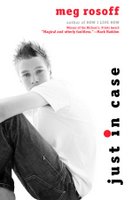 Life as We Knew It by Susan Beth Pfeffer
Life as We Knew It by Susan Beth Pfeffer
When the blurb on the back of a book tells you to "Clear some space in your schedule: You won't want to be interrupted as you read this nail-biting drama". You should heed their advice. You should not start reading it at 10 pm when you have to get up early for work the next morning. Okay, I don't know about you, but I really should have known better.
I asked the library to order Life as We Knew It back in October, and it just finally came in yesterday. (I do find it interesting that a book I've been waiting for ages just happens to show up several days after it makes the BBYA list -- especially since the same thing happened with Princess Academy and the Newbery Honor last year... but I digress...)
So, I checked it out last night at work, went home, took a shower, made myself a cup of apple cider, and started reading. Bad idea. At midnight, I figured I should probably go to sleep, so I put the book on my nightstand, lay there for a few minutes, realized there was no way I was going to fall asleep without finishing it, and picked it back up. I was able to finish it by about 1, but then it still took me a little while to get to sleep. So, now I'm at work, and it just happens to be the one day of the week that I work 11 hours... and I'm really tired. But it was so worth it.
Life as We Knew It is written as a series of journal entries, beginning as Miranda is finishing her sophomore year of high school. She writes about her classes, and her grades, and her summer plans, and "that moon thing" that is about to happen.
"That moon thing" is that an asteroid is going to hit the moon -- which, while cool to watch, shouldn't be that big of deal. But the asteroid is more dense than anyone expected, and when it hits the moon, the moon shifts off its axis, causing all sorts of changes on the earth. For example, since the moon controls the tides, almost immediately, there are huge tidal waves covering much of the east and west coast -- the Statue of Liberty even washes out to sea (This is really what freaked me out the most -- since my boyfriend goes to school in New York City).
As soon as this happens, everything changes for Miranda and her family (younger brother Jonny, older brother Matt, and their mother) -- everyone begins stockpiling food, gas prices start sky-rocketing, schools close because they are running out of food to feed the students. And every time they think it can't get any worse, something else happens... keeping Miranda and her family desperately fighting for survival.
What is really scary though, is how suddenly it all happens -- this novel isn't set hundreds of years in the future -- the journal entries have dates, but not years, and Miranda's early journal entries make her seem like an average teenage girl of today. And we know that things like this can happen -- though on a smaller scale -- we've seen what Hurricane Katrina did to New Orleans, we watched the footage of the Tsunami in Indonesia and Thailand.
And most of us have just enough experience with storms and power outages to have some idea of how this would be. Personally, I remember hurricane Isabel (2003), when we lost power for three or four days, and I had to eat cold ravioli out of a can, and we didn't have air conditioning, and all of the stop-lights were out. And that is absolutely nothing compared to what Miranda goes through -- but remembering it makes it just a little bit easier to imagine her suffering.
Life as We Knew It terrifies me and makes me want to start hoarding canned goods -- but I still loved it and want to recommend it to everyone who might possibly enjoy dystopian or end-of-the-world type fiction. But please, beware, once you start this one, you won't want to put it down.








